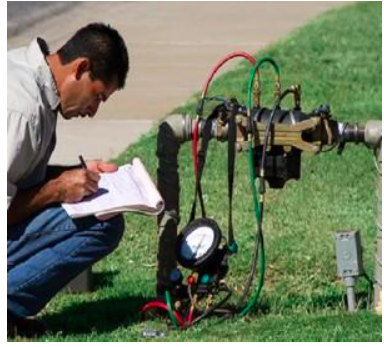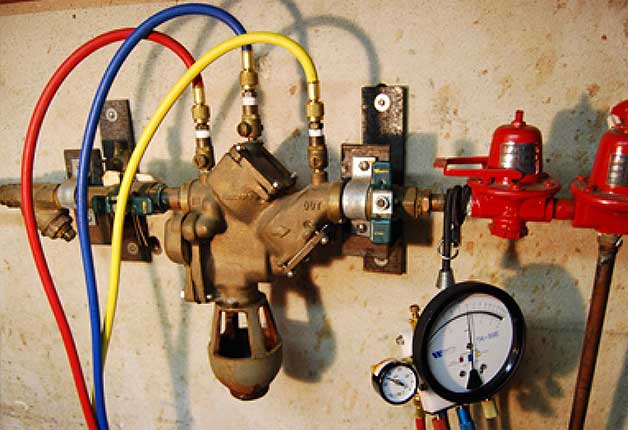Should I Examine My Water for Backflow
Should I Examine My Water for Backflow
Blog Article
This post which follows relating to Backflow Assembly Testing is definitely stimulating. You should look it over.

Yes, you need to backflow test your house's water system to ensure that the water is free of contaminants and hazardous degrees of chemicals. Because of the tools called for and area for error, you should not attempt to carry out backflow screening on your own. We recommend that you call an expert plumber every couple of years to test your water.
Heartburn Can Effect Both You as well as Your City
Since unsafe backflow can affect the public water supply in addition to a solitary building, many cities establish backflow guidelines. Thankfully, contemporary cities have backflow devices in position that shield the water supply that comes from many houses and industrial residential or commercial properties. The genuine hazard comes from irrigation systems, which can damage the water supply with harmful plant foods, manure, as well as various other chemicals.
What Causes Backflow?
A typical reason for heartburn is a loss of water pressure that creates the water to siphon back into the supply of water. An example is cleaning a paint bucket utilizing a hose. You fill up the paint pail up with water, leaving the hose pipe in the pail. After some time, there is a loss in water pressure and the pipe starts to suck the water back right into the water. As you can think of, there are currently chemicals from the paint that are getting in the water, possibly posturing a threat. Sadly, lots of people are not even familiar with backflow testing, but there are several reasons it's so important.
Backflow Screening is Needed by Law in Particular Cities
Depending on where you live, you might actually be required by regulation to backflow examination your regulation. Iowa City maintains a document of all residential properties offered by the city's water supply.
You Can Stop Backflow
The major function of a backflow tool is to stop water from flowing in reverse into your water supply. Plumbing technicians install the tool on the pipes in your home to ensure that the water just moves in the appropriate direction.
What is Heartburn?
In other words, heartburn is when water moves upwards-- the opposite direction in the plumbing system. This is likewise called "backpressure." When the water moves in this direction, it can mix with dangerous contaminants and position a risk.
Call a Plumber to Check for Heartburn Prior To It is Far too late
While it may appear grim, polluted water can cause horrible bacterial as well as viral infections that are challenging to treat. A plumbing firm can rapidly test your house's water to figure out if there are any kind of dangerous chemical degrees. If you can stay clear of the anguish that comes from drinking contaminated water, the little financial investment is. As well as if you do uncover that your water has high degrees of toxic substances, a plumber can conveniently install a backflow prevention tool.
Yes, you require to backflow examination your residence's water supply to guarantee that the water is complimentary of toxic substances and dangerous degrees of chemicals. Several cities develop backflow guidelines due to the fact that dangerous heartburn can influence the public water supply in addition to a solitary structure. A common reason of heartburn is a loss of water pressure that causes the water to siphon back into the water supply. After some time, there is a loss in water pressure as well as the hose begins to draw the water back into the water supply. The main objective of a backflow tool is to avoid water from moving in reverse into your water supply.
WHY DOES BACKFLOW TESTING NEED TO BE DONE EVERY YEAR
What Is Backflow?
Toxic gas backing up into a building is one example of potential backflow issues, but backflow can occur in many other ways.
Backflow is generally referred to as the reversal of a liquid or gas in a plumbing system.
Most issues for the public occur with backflow resulting in contaminated drinking water. If you look up backflow issues online you’ll probably find references to “potable” water. That means drinking water.
There have been backflow issues in the past with drinking water. Chemicals, sewage and other contaminants have found their way into drinking water causing health issues for those that count on the fresh water.
What Causes Backflow?
In a residence or commercial building water generally flows one way. This normal flow is usually driven by consistent pressure in the water and waste system.
Anything that changes the normal pressure in the system can lead to backflow.
Fire hydrant use or malfunction can reverse the normal pressure in the system on a city line, but backflow can occur in a number of different ways.
Sometimes backpressure might be caused by someone using a garden hose and submerging the end of the hose in a pool of liquid. If pressure is lost the flow could reverse and contaminants could be released into the drinking water.
Anytime there is a connection between contaminants and the drinking water there is potential for a backflow issue. Sometimes these connections are not immediately obvious like the garden hose connecting to a building’s drinking water supply.
Backflow Regulations
The Environmental Protection Agency (EPA) provides guidelines and regulations for state and local governments regarding backflow. State and local governments also have their own guidelines and regulations for backflow prevention.
Arizona has its own backflow regulations.
Due to issues with backflow in the past, regulations require backflow preventer devices to be used in nearly all residential and commercial buildings.
A backflow preventer is a device that prevents backflow as cross-connection points where potential backflow issues may occur.
While backflow is not a common occurrence, preventers are in place to make sure there is no contamination should something malfunction or go wrong with a building’s water supply.

I came across that blog posting about Commercial Backflow Testing when scouting around the web. If you enjoyed our blog entry kindly do not forget to share it. Thank-you for your time spent reading it.
Book Now! Report this page